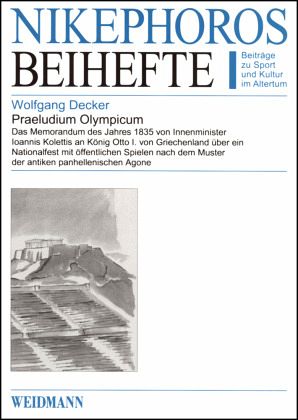Nicht lieferbar

Praeludium Olympicum
Das Memorandum des Jahres 1835 von Innenminister Ioannis Kolettis an König Otto I. von Griechenland über ein Nationalfest mit öffentlichen Spielen nach dem Muster der antiken panhellenischen Agone.
Versandkostenfrei!
Nicht lieferbar
Es ist bekannt, daß der französische Baron Pierre de Coubertin das größte internationale Sportfest unserer Tage im Jahre 1894 auf einem Kongreß in Paris wiederbegründet hat. Weniger bekannt ist, daß bei dieser Neubelebung der antiken Sportfeste, die mehr als tausend Jahre Bestand hatten, die nationalen Olympien der Griechen im 19. Jahrhundert eine entscheidende Rolle gespielt haben. Fast gänzlich unbekannt ist jedoch die Tatsache, daß bereits 1835, ganz zu Anfang des modernen griechischen Staates, in einem Memorandum an König Otto I. die Einrichtung eines Nationalfestes mit sportlich...
Es ist bekannt, daß der französische Baron Pierre de Coubertin das größte internationale Sportfest unserer Tage im Jahre 1894 auf einem Kongreß in Paris wiederbegründet hat. Weniger bekannt ist, daß bei dieser Neubelebung der antiken Sportfeste, die mehr als tausend Jahre Bestand hatten, die nationalen Olympien der Griechen im 19. Jahrhundert eine entscheidende Rolle gespielt haben. Fast gänzlich unbekannt ist jedoch die Tatsache, daß bereits 1835, ganz zu Anfang des modernen griechischen Staates, in einem Memorandum an König Otto I. die Einrichtung eines Nationalfestes mit sportlichem Programm nach antikem Muster vorgesehen war. Der Text enthält den ersten schriftlich fixierten Plan in der Moderne für die Gestaltung einer Festlichkeit, die bereits sein Autor, der griechische Poet Panagiotis Soutsos, "Olympische Spiele" nannte. Das neu entdeckte Dokument wird ediert, übersetzt, kommentiert und in den Kontext seiner Zeit eingebettet sowie im Hinblick auf seine hohe Bedeutung für die Geschichte der modernen Olympischen Bewegung bewertet.It is well known that the French Baron Pierre de Coubertin re-founded the greatest international sporting festival of our age at a congress in Paris in 1894. Less well known is the decisive role played in this resurrection of an ancient sporting festival of over 1000 years' standing by the national Olympics of the Greeks in the 19th century. Almost totally forgotten is the fact that as early as 1835, at the very beginning of the modern Greek state, the establishment of a national festival with a programme of sporting events on the ancient model was planned in a memorandum to King Otto I. The text contains the first definite plan in the modern age for a festival which the author, Greek poet Panagiotis Soutsos, was already calling 'Olympic Games'. The rediscovered document has been edited, translated, provided with a commentary and set in the context of its age as well as being evaluated in respect of its major significance for the history of the modern Olympic movement.



